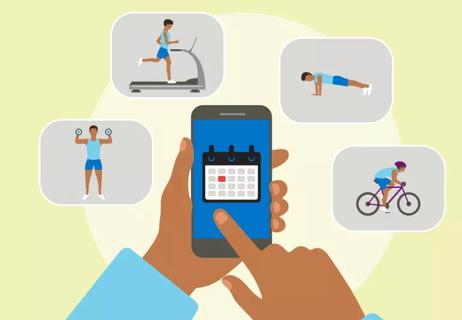Sneaking off or turning down social activities to exercise might be signs of an addiction

Maybe it started off as a resolution to get in the best shape of your life. But your once-celebrated exercise habit now seems to be taking over — and your loved ones are getting concerned. Could you be addicted to exercise?
Advertisement
Cleveland Clinic is a non-profit academic medical center. Advertising on our site helps support our mission. We do not endorse non-Cleveland Clinic products or services. Policy
“Exercise addiction is real, and it can lead to many harmful consequences,” says psychiatry specialist Lindsay Honaker, DO.
Dr. Honaker explains how to tell if you’re addicted to exercise — and how to overcome it.
An addiction is when you are psychologically or physically dependent on a substance or behavior. “With an exercise addiction, you have the urge or feel the need to exercise even when it leads to negative consequences,” says Dr. Honaker.
While exercise is beneficial, doing it in excess, too intensely or in extreme conditions can be dangerous. “When you don’t give your body enough rest, your immune system weakens. A weakened immune system makes you more susceptible to illnesses like influenza and COVID-19,” she continues.
“I have also seen cases — more often than you might think — of people who push themselves beyond their limit and develop a life-threatening condition called rhabdomyolysis. Rhabdomyolysis is the breakdown of muscles, which ultimately leads to kidney failure.”
Overexercising can stress your body, increasing your risk of:
Dr. Honaker warns that an exercise addiction can sometimes be a gateway to other addictions. “Some may resort to taking substances, such as high-dose caffeine, Adderall™ and stimulants, to exercise through illness or low energy. I even know fitness competitors who use both stimulants and illegal substances like cocaine to push through,” she shares.
Advertisement
“Or you could break a bone and keep working out despite your doctor’s advice, making you prone to more and worse injuries down the road,” she adds.
Our brains are hard-wired with a reward system. When you experience something pleasurable, this system releases a feel-good hormone called dopamine. But dopamine is just one of several happy hormones your body makes. Your pituitary gland also releases endorphins, which act like natural pain relievers and increase pleasure.
When you work out, your body releases both endorphins and dopamine. (Ever heard of a runner’s high?)
“When the effects of these hormones wear off, your brain remembers how they made you feel. It then wants to do the same behavior again to get those happy feelings back,” Dr. Honaker explains. “The brain does the same thing when people use substances like cocaine. That’s what leads to addictive behavior.”
While exercise addiction isn’t that common in the general population, Dr. Honaker says it’s more common in people who have eating or anxiety disorders. It’s also more commonly associated with certain types of exercise, like:
To figure out if you have a problem, Dr. Honaker recommends asking yourself:
If you answered yes to some of these questions, you may need help to regain balance in your exercise habit. “The first step is recognizing there’s an issue,” notes Dr. Honaker. “Talk with a trusted friend to help you better understand if you’ve crossed the line from healthy to obsessed.”
If you think you may be addicted to exercise, you aren’t alone. And there are several ways you can overcome it:
Dr. Honaker recommends slowly stepping back from your exercise routine. “Don’t stop abruptly. That would be more detrimental because you’ll want to go back and work out even harder,” she says. “Instead, start by reducing the number of days, hours or intensity of your workouts and go from there.”
Advertisement
Therapists can not only help you create a plan to scale back, but they can also help you change the way you think about exercise. And if you have other medical issues like anxiety, depression or an eating disorder, they can help you manage them, too. “Look for a therapist who does cognitive behavioral therapy (CBT). Sports psychologists are also an excellent potential resource,” Dr. Honaker advises.
Medication may help those who use exercise to cope with anxiety, depression or stress. Antidepressants such as SSRIs (selective serotonin reuptake inhibitors) can help with obsessive thoughts about exercise. They’re also helpful for people with coexisting eating disorders.
Don’t know where to start? Pay a visit to your primary care provider or a healthcare provider, and be open with them about your exercise and eating habits. They can help you figure out your treatment options and best next steps.
“It’s also important to keep up with your blood work,” Dr. Honaker says. “Sometimes, your doctor can see deficiencies in your lab work that can be a symptom of an exercise addiction.
She continues, “Exercise is a great way to reduce your stress hormones, which helps you cope with anxiety and depression. But when you cross the line from just enough to too much exercise, you end up spiking those cortisol (stress hormone) levels instead. It’s a fine balance, but you can definitely achieve it.”
Advertisement
Learn more about our editorial process.
Advertisement

The exercise — which you’ve probably been doing since grade school — can be intimidating, but proper form can help

Exercise lowers risk for heart conditions, improves mental health and reduces visceral fat that can compromise your organs

Ask questions, get referrals and consider if someone is a good fit for you and your fitness goals

Expect a few bumps in the road, work out for the right reasons and give yourself some credit

Jump into the swing of things to improve your coordination, burn calories and get your heart rate going

Walking with a weighted backpack is a low-impact, full-body workout that’s growing in popularity

A super high heart rate means you’re burning more than fat

Meet your workout goals by accounting for frequency, intensity, time and type

Type 2 diabetes isn’t inevitable with these dietary changes

Applying a hot or cold compress can help with pain